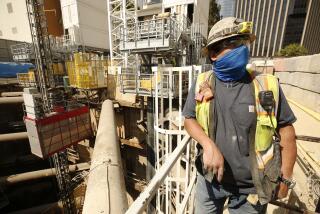Defense Industry Graft Scored by House Panel
WASHINGTON â Federal authorities have been told that up to half of the purchasing agents for Southern California defense contractors take kickbacks in return for awarding lucrative subcontracts, Robert C. Bonner, the U.S. attorney in Los Angeles, told a Senate subcommittee Thursday.
âKickbacks on defense subcontracts are a pervasive, longstanding practice which has corrupted the subcontracting process at most, if not all, defense contractors and infected most, if not all, defense procurement programsâ in Southern California, said Bonner, who testified from Los Angeles through a telephone hookup.
Bonner, federal attorney for the district that includes Los Angeles and Orange counties, said his information came from âreliable and informed individuals who have been cooperating with the governmentâs investigation of the problem.â Kickbacks are bribes that subcontractors pay to contractors from whom they receive work.
Sen. William S. Cohen (R-Me.), chairman of the Senate Governmental Affairs subcommittee on oversight, noted that awarding subcontracts on the basis of which companies are willing to pay kickbacks not only costs the government more but could also mean that critical and sensitive work is being done by subcontractors that are not best qualified to do it.
Threat to Security
âYouâre talking about potentially jeopardizing the security of this country,â Cohen said. âItâs far more serious than just stealing a little money off the top.â
The panel had planned to hear testimony from an anonymous subcontractor to be identified only as âMr. Smith,â but the witness canceled his appearance. Sen. Carl Levin (D-Mich.), the subcommitteeâs top-ranking Democrat, said that, despite the subcommitteeâs assurances of anonymity, âMr. Smithâ feared âretaliation against the business for which he works and himself personally.â
Cohen said âMr. Smithâ had told subcommittee staff members that he had tried to operate without paying kickbacks and that he had complained to a major defense contractor that other subcontractors were bribing the contractorâs purchasing agents. The contractor responded by âblackballingâ Smithâs firm, which had previously done $200,000 worth of business with the contractor.
Witnesses from the FBI and Justice Department detailed for the subcommittee a variety of schemes through which subcontractors pay off purchasing agents.
Focus of Testimony
While the law enforcement officials said such problems occur in other regions, Southern California is the focus of much of their testimony, primarily because of its dense concentration of defense firms.
Joseph T. Sheehan, supervisory special agent in the FBIâs Los Angeles office, played a tape recording that had been used as evidence against Ronald Emile Brousseau, a Northrop Corp. procurement administrator subsequently convicted of accepting a $4,000 bribe.
Brousseau, not knowing that his conversation with a subcontractor was being recorded secretly, had demanded a 5% kickback on subcontracts plus 25% of the difference between the subcontractorâs minimum bid and the higher amount that the subcontractor would be able to bid once Brousseau informed him of the prices at which other competitors had offered to do the work.
The 44-year-old purchaser had bragged: âI firmly intend to retire at (the age of) 55 . . . if I just take a little piece here and a little piece there. . . . The people that get greedy are the people that get caught.â
Levin and Cohen, who contend that the existing anti-kickback law is not tough or sophisticated enough, are drafting legislation that would stiffen its penalties and expand its coverage to more forms of kickback schemes.
More to Read
Get the L.A. Times Politics newsletter
Deeply reported insights into legislation, politics and policy from Sacramento, Washington and beyond. In your inbox three times per week.
You may occasionally receive promotional content from the Los Angeles Times.










